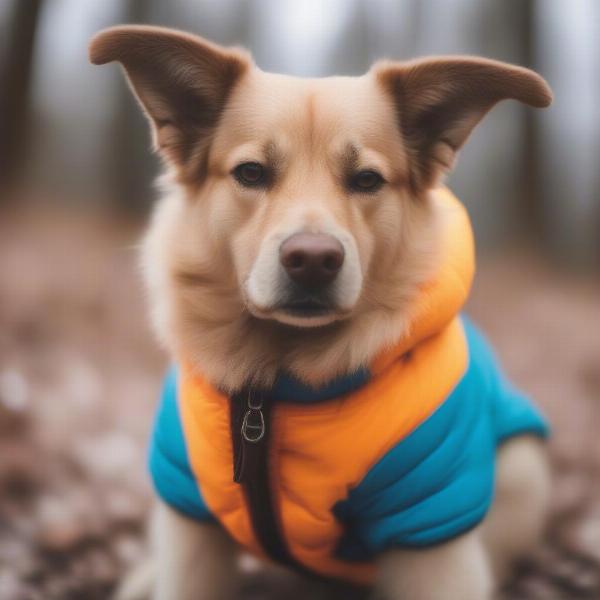The age-old question: what are hot dogs called in the winter? Surprisingly, they’re still called hot dogs! While the name doesn’t change with the seasons, our enjoyment of this classic treat certainly can. Whether grilled at a summer barbecue or enjoyed steaming hot on a chilly winter day, hot dogs remain a favorite food for many, especially alongside our canine companions. But can dogs eat hot dogs? Let’s explore this topic and more as we delve into the world of hot dogs and their relationship with our furry friends.
While we might enjoy a juicy hot dog, it’s crucial to understand that sharing this treat with our dogs is generally not recommended. Hot dogs are processed meats loaded with sodium, preservatives, and other additives that aren’t beneficial for canine health. These ingredients can contribute to digestive upset, pancreatitis, and long-term health issues like obesity and heart problems.
Can Dogs Eat Hot Dogs? The Risks and Alternatives
Feeding your dog a hot dog occasionally might not cause immediate harm, but it’s not a healthy habit. The high sodium content can lead to dehydration and excessive thirst, while the nitrates and other additives can be toxic in large amounts. Certain spices commonly used in hot dogs, like onion and garlic powder, are also dangerous for dogs.
Healthier Snack Options for Your Canine Companion
Instead of hot dogs, opt for healthier treats specifically designed for dogs. These include:
- Small pieces of cooked, unseasoned chicken or turkey
- Carrot sticks
- Apple slices (remove seeds and core)
- Plain yogurt (unsweetened and without artificial sweeteners)
- Dog biscuits or training treats formulated for their nutritional needs
These alternatives provide essential nutrients without the harmful additives found in processed human foods.
Hot Dogs and Dogs: A Winter Warmer?
While hot dogs aren’t suitable for dogs, winter does present unique challenges for pet owners. Keeping our furry friends warm and safe during the colder months is essential.
 Dog wearing a winter coat
Dog wearing a winter coat
Keeping Your Dog Warm in the Winter
Here are some tips for ensuring your dog’s comfort and safety during winter:
- Provide adequate shelter: Make sure your dog has a warm, dry place to escape the cold. This could be inside your home or a well-insulated outdoor dog house. pet house for dogs
- Invest in winter gear: A warm coat or sweater, especially for short-haired breeds, can make a big difference. dog vests for large dogs Consider protective booties for their paws if you live in an area with snow or ice. dogs boots
- Limit outdoor exposure: Avoid prolonged walks in freezing temperatures, especially for puppies and senior dogs.
- Provide plenty of fresh water: Ensure your dog has access to unfrozen water at all times, as dehydration can be a problem in winter.
Winter Safety Tips for Dog Owners
“Winter can be a challenging time for dogs, especially with the drastic temperature changes,” says Dr. Emily Carter, a veterinarian with over 15 years of experience. “Providing proper insulation, appropriate outerwear, and limiting exposure to extreme cold are crucial for their well-being.”
Dr. Carter also emphasizes the importance of checking your dog’s paws after walks in snowy or icy conditions. “Salt and de-icing chemicals can irritate their paws,” she explains. “Wipe their paws clean after each walk to prevent irritation and potential ingestion of harmful substances.” rubber boots for dogs
Conclusion
So, while hot dogs retain their name throughout the year, they don’t belong in your dog’s winter (or summer) diet. Focusing on proper winter care for our canine companions ensures their health and happiness throughout the colder months. By following these tips and prioritizing their well-being, we can help our furry friends enjoy a safe and comfortable winter season.
FAQ
- Can I give my dog a small piece of a hot dog as a treat? While a tiny piece might not be immediately harmful, it’s best to avoid hot dogs altogether due to their unhealthy ingredients.
- What are some healthy alternatives to hot dogs for my dog? Cooked, unseasoned chicken or turkey, carrot sticks, apple slices, plain yogurt, and dog biscuits are healthier options.
- How can I tell if my dog is cold in the winter? Signs of coldness include shivering, whining, curling up, and reluctance to go outside.
- Is it safe to walk my dog in the snow? Short walks are generally safe, but avoid prolonged exposure to freezing temperatures, especially for puppies and senior dogs. wellingtons for dogs
- What should I do if my dog’s paws get irritated from salt or de-icing chemicals? Wipe their paws clean after each walk and consider using protective booties.
- Are there any specific breeds that are more susceptible to cold weather? Small, short-haired breeds are generally more sensitive to cold than larger, long-haired breeds.
- How can I keep my dog entertained indoors during the winter? Indoor games, puzzle toys, and training sessions can provide mental and physical stimulation.
ILM Dog is your trusted source for expert advice on dog care and wellbeing. We offer a wide range of information on dog breeds, health, training, nutrition, grooming, and much more. From puppy care to senior dog support, we’re here to help you every step of the way. Contact us for expert advice and personalized recommendations. Email: [email protected]. Phone: +44 20-3965-8624. Visit ILM Dog for all your dog care needs.